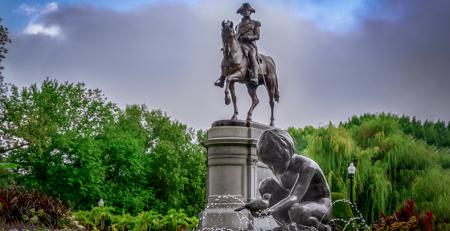Be a Good Neighbor
There are a variety of ways to positively engage with your community, prevent pollution and keep Boston beautiful. The easiest way to start is by becoming a good neighbor.
Scoop the Poop
Why Scoop?
Pet waste contains potentially harmful microorganisms, which can cause stomach illness and rashes in humans. Pet waste that is not scooped up or is dumped down a catch basin can get flushed directly into storm drains. Storm drains discharge directly to Boston Harbor or the Charles, Muddy, Mystic, or Neponset Rivers. Thousands of people boat, fish and use these water bodies recreationally every day.
Scoop the Poop
The City of Boston's dog fouling ordinance requires dog owners to remove and properly dispose of any feces left by their dogs. This ordinance covers waste left by dogs on sidewalks, streets, parks and neighbors' yards. If you have any questions about the Scoop the Poop Law, please contact the City of Boston's Animal Control at 617-635-5348.
Help Protect the Environment
When walking your dog, take a plastic bag with you to pick up the pet waste. Be sure to place the bag in a trash receptacle, never dispose of pet waste in a catch basin. Dog waste cannot be used as fertilizer. Never place dog waste near a tree or in the soil - the bacteria in the waste does more harm than good and it also can end up in a local waterway.
Help Educate Your Community
BWSC is dedicated to helping create a cleaner, more enjoyable, rivers and harbor in the future. Tell a friend, neighbor, or family member how to properly dispose of pet waste. Individuals and groups can help by stenciling “Don’t Dump” awareness messages next to the catch basins. BWSC's Storm Drain Stenciling Program can help organize such an effort and provide the necessary materials. Contact Community Relations at 617-989-7995 for additional information on this program.
Fats, Oils and Grease (FOG)
Fats, oils, and grease (FOG) are one of the leading causes of sanitary sewer overflows (SSOs). SSOs are backups in either the public sewer or residential plumbing. The easiest way to prevent grease problems and sewer blockages is to pour grease into a covered disposable container and put it in the trash. Never pour grease down sink drains or into toilets. The grinding of meat products, dairy products, or other cooked foods in garbage disposals allows grease to be introduced into the sewer system. FOG will accumulate and eventually form blockages.
Most grease is a byproduct of cooking and is usually found in such things as:
- Food scraps
- Meat fats
- Lard
- Cooking oil
- Butter and margarine
- Baked goods
- Sauces
- Dairy products
Tips to reduce FOG from entering the drain:
- Soak up remaining fats, oils and grease with paper towels and dispose of with your trash
- Before you wash dishes, scrape meats and food with fat and grease into the trash
- Put baskets or strainers in sink drains to catch food scraps and other solids, and empty the drain basket or strainer into the trash
- Only use garbage disposals for fruits, vegetables, and organic waste
BWSC provides free reusable grease can lids to residents. To request a grease lid complete the form on the Grease Lids page.
For more information, download our FOG Brochure.
FOG Brochure (English)
For information about FOG in commercial kitchens, see Commercial Kitchen Grease Trap Guidelines.
Keep Wipes Out of Pipes
There are many disposable wipes that claim to be “flushable” and “sewer safe.” However, these wipes do not break down as they travel through pipes and into the sewer system. Disposable wipes, even those labeled “flushable“ should be disposed of in the trash. Wipes can create clogs in both household plumbing and the public sewer system and result in sewer backups.
Don't Flush:
- Bathroom wipes
- Baby wipes
- Disinfecting wipes
- Towelettes
More ways to help
Report an Incident
To report illegal dumping, an emergency, or water theft continue to the Report an Incident page.
Report an Incident
Garden Tips
When it rains, excess chemical, which can include pesticide and herbicides be come runoff and pollute local waterways. By utilizing companion plants you can increase the productivity and health of your garden and use less pesticide and herbicides. Companion plants benefit surrounding plants with pest control, pollination or soil enrichment.
Common companion plants:
- Geraniums planted alongside roses will attract pests away from the roses
- French marigolds produce a natural pesticide from its roots and is a companion plant to most flowers and Yarrow improves overall soil quality and its leaves can be used as mulch
Tips for Reducing Water Use:
- Place plants that need a lot of water near each other and save time and water by only watering one area of your yard
- Use plants native to New England because they need relatively little water, fertilizer or care once established
- Use mulch in a garden to reduce water evaporation from soil and limit weed growth
Keep Your Catch Basins Clear
During storm events, rainwater flows into the catch basins in the street and into the storm drain system, which transports rainwater directly to local waterways. Debris on top of catch basins, including trash, can prevent rainwater from flowing into the storm drain system, causing streets to flood. Debris can also travel with rainwater through the storm drain system and pollute local waterways.
To prevent street flooding and pollution:
- Clear leaves from the catch basins and dispose of leaves with yard waste
- Clear debris from the top of catch basins and place into a trash receptacle
- Sweep up debris from sidewalks and driveways and place into a trash receptacle; do not sweep debris into catch basins

